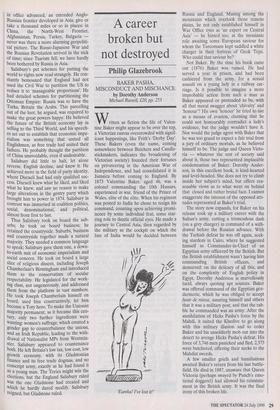A career broken but not destroyed
Philip Glazebrook
BAKER PASHA, MISCONDUCT AND MISCHANCE by Dorothy Anderson Michael Russell, £20, pp. 253 Written as fiction the life of Valen- tine Baker might appear to be over the top, a Victorian canvas overcrowded with signif- icant happenings, like Frith's 'Derby Day'. These Bakers (even the name, coming somewhere between Butchers and Candle- stickmakers, indicates the broadening of Victorian society) founded their fortunes on privateering in the American War of Independence, and had consolidated it in Jamaica before coming to England. By 1873 Valentine Baker. aged 46, was a colonel commanding the 10th Hussars, experienced in war, friend of the Prince of Wales, elite of the elite. When his regiment was posted to India he chose to resign his command, counting upon achieving promi- nence by some individual feat, some star- ring role to dazzle official eyes. He made a journey to Central Asia, then regarded by the military as the cockpit on which the fate of India would be decided between 'Eureka! I've lost it!' Russia and England. Musing among the mountains which overlook those remote plains, he not only established himself in War Office eyes as 'an expert on Central Asia' — he hinted too, at the messianic role awaiting some European saviour for whom the Turcomans kept saddled a white charger in their fortress of Geok Tepe. Who could that saviour be?
Not Baker. By the time his book came out (1876) Baker was ruined. He had served a year in prison, and had been cashiered from the army, for a sexual assault on a young lady in a railway car- riage. Is it possible to imagine a more improbable action from such a man as Baker appeared or pretended to be, with all that moral swagger about 'chivalry' and `honour'? His own 'honour' he tried to use as a means of evasion, claiming that he could not honourably contradict a lady's evidence, but the judge wouldn't have it. Nor would the judge agree with Baker that he was too grand to expect a fair trial from a jury of ordinary mortals, as he believed himself to be. The judge and Queen Victo- ria — whatever the rest of society said about it, those two represented implacable condemnation of Baker. Dorothy Ander- son, in this excellent book, is kind-hearted and level-headed. She does not try to climb inside her subject's mind, but offers rea- sonable views as to what went on behind that closed and rather brutal face. I cannot exaggerate the interest of the opposed atti- tudes represented at Baker's trial.
The story now expands, for Baker on his release took up a military career with the Sultan's army, cutting a tremendous dash (on a grey charger) in command of a with- drawal before the Russian advance. With the Turkish defeat he was off again, seek- ing stardom in Cairo, where he suggested himself as Commander-in-Chief of an Egyptian army officered by the British. But the British establishment wasn't having him commanding British officers, and demurred: on the delicacy of all this, and on the complexity of English policy in Egypt, Dorothy Anderson is marvellously lucid, always quoting apt sources. Baker was offered command of the Egyptian gen- darmerie, which he was obliged to accept faute de mieux, assuring himself and others that it was a military post, and that the rab- ble he commanded was an army. After the annihilation of Hicks Pasha's force by the Mandi, it suited the Khedive to go along with this military illusion and to order Baker and his unsoldierly mob out into the desert to avenge Hicks Pasha's defeat. His force of 3,746 men panicked and fled, 2,373 were butchered, offering their necks to the Mandist swords.
A few smaller griefs and humiliations awaited Baker's return from his last battle- field. He died in 1887, unaware that Queen Victoria (perhaps swayed by Punch's emo- tional doggerel) had allowed his reinstate- ment in the British army. It was the final irony of this broken life.


























































 Previous page
Previous page